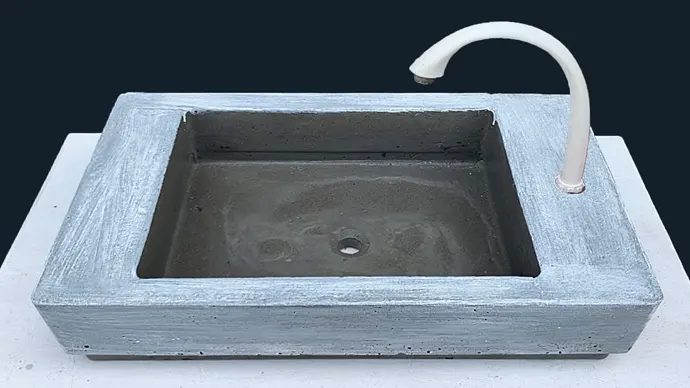Concrete sinks are highly favored among homeowners because of their sturdy construction and unique appearance, but as concrete is a penetrable material, it can absorb liquids and accumulate bacteria without being sealed. Consequently, a concrete sink needs to be adequately sealed.
By sealing the sink, you prevent water and other contaminants from seeping into the porous concrete and causing degradation. But how to seal a concrete sink using the correct sealer? Although many types of concrete sealers are available, not all are intended for use on concrete sinks.
Sealing a concrete sink is a simple process that helps to protect the sink surface from deterioration and maintain its appearance correctly. The following information will help you understand how to secure a concrete sink and make it waterproof using the correct concrete sealer.
How to Seal a Concrete Sink: 5 Steps
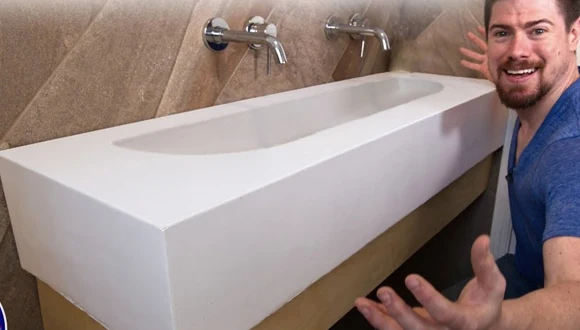
Concrete is a surprisingly versatile material. It can be used to create everything from countertops to furniture, but you have to take care of it properly to ensure it lasts. Sealing your concrete sink will protect it from corrosion, staining, and other potential problems.
Here’s how to do it:
Step 01. Gather All Supplies
You should collect all of the necessary supplies that you need before you start sealing your concrete sink. This includes:
- Soap
- Warm water
- Foam brush or sponge
- Rubber gloves
- Respiratory mask
- Paintbrush or roller
- Clean cloth,
- Penetrating sealer
Step 02. Clean the Sink Thoroughly
To clean a concrete sink entirely, you must use soap, warm water, and a sponge. Start by wetting the sponge in warm water and then adding a small amount of soap. Now, gently scrub the entire surface of the sink, paying particular attention to any filthy areas.
Once you have scrubbed the sink clean, rinse it with warm water to remove any soap residue. Now let dry the sink with a soft clean cloth to prevent water spots from forming.
Step 03. Apply the Penetrating Sealer
Unlike other surfaces, concrete sinks must be sealed evenly to prevent any problems. You need to apply a penetrating sealer with a brush roller. Pour the sealer into a paint tray and load a paintbrush or roller.
Roll the brush to apply a thin layer of the sealer to the sink in even strokes, working in small sections. Be sure to cover the entire area of the sink, including the underside and any seams or cracks.
Step 04. Let the Sealer Dry
Most types of concrete sealer will be dry to the touch within three to six hours after application. Yet, it is essential to let the sealer cure for the amount of time specified by the manufacturer before using the sink.
For example, if you use a water-based penetrating sealer, it may be dry to the touch in just a few hours but may not be fully cured for up to 48 hours.
During this time, it is vital to avoid exposing the sink to water or other liquids. Once the sealer is fully cured, it will be resistant to stains and water damage.
Step 05. Apply a Top Coat of Sealer
A top coat of sealer is the last step in sealing a concrete sink. Wait until the previous coats have dried before applying them. Apply a thin layer of sealer with a brush or roller. Allow the top coat to dry for 24 hours before using the sink.
Following these simple steps, you can ensure that your concrete sink is adequately sealed and protected from stains and wear.
Do Concrete Sinks Need to be Sealed?
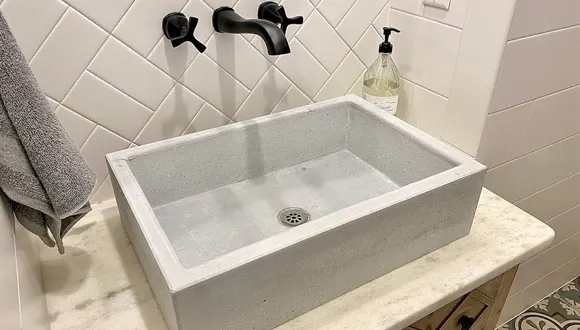
Concrete sinks are a popular choice for many homeowners because of their durability and unique appearance, but concrete is a porous material that can absorb water and stains. For this reason, concrete sinks must be sealed regularly to protect them from damage.
The frequency you need to seal your sink will depend on how often it is used and how well it is cared for. For example, bathroom concrete sinks used infrequently may not need to be sealed, while a kitchen sink that uses a lot may benefit from regular sealing.
When Should I Seal the New Concrete Sink?
While Concrete sinks offer a unique look but require proper maintenance to keep them looking their best, sealing the concrete surface is a critical step in caring for a concrete sink. But when is the best time to do this?
You should wait until the concrete sink has cured before applying a sealer. Before using the sealant, it is best to wait at least 30 days after installing the sink. This will give the concrete time to cure and harden fully.
But, it may be sooner, depending on the specific type of concrete used. This will help ensure that the sealer adheres appropriately to the surface.
What is the Recommended Sealer to Seal a Concrete Sink?
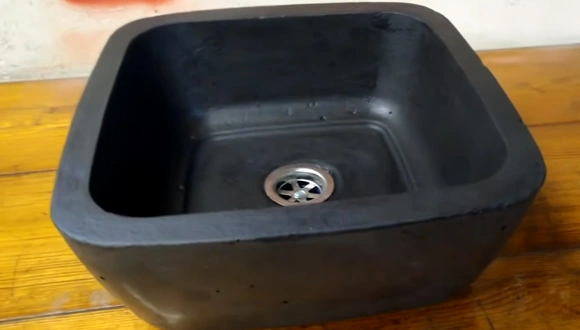
When sealing a concrete sink, urethane coatings are often the recommended sealer. These coatings are an excellent option for sealing concrete sinks because they become chemically inert as soon as they cure. This means that they won’t react with any cleaners or chemicals that come into contact with them, making them very durable.
Urethane coatings also have excellent resistance to abrasion and wear, so they won’t be damaged easily by scrubbing or cleaning. This makes them ideal for sealing concrete sinks constantly exposed to water and moisture.
Also, these coatings can be applied in skinny coats so that they won’t change the appearance of the concrete sink too much. A urethane coating is a good option if you’re looking for a sealer that will provide durable protection and resist damage from cleaning.
How Do You Maintain a Sealed Concrete Sink?
Most importantly, to maintain a sealed concrete sink, you need to clean it regularly. Weekly cleaning is usually sufficient, but if you notice any dirt or stains, you should clean it as soon as possible. The best way to clean a concrete sink is with natural soap.
You can either use a store-bought natural soap or make your own by mixing one part baking soda with eight parts water. If you choose to use a store-bought soap, be sure to select one that is designed for use on sealed concrete.
For daily cleaning, simply wipe down the sink with a damp cloth. When deeper cleaning is required, use a mild soap and water solution. Avoid scrubbing too vigorously, as this can also damage the sealant.
Does Sealing the Concrete Sink Make it Waterproof?
Concrete is a porous material, which means it can absorb water and liquids. When water is absorbed into the concrete, it can cause the material to expand and crack. To prevent this from happening, you can seal your concrete sink.
But you may wonder if there is anything you can do to protect it from water damage. The good news is that it can waterproof and protect your concrete sink by sealing it. This will create a barrier that will help to keep water from seeping into the concrete and causing damage.
How Many Coats of Concrete Sealer Should I Use for the Concrete Sink?
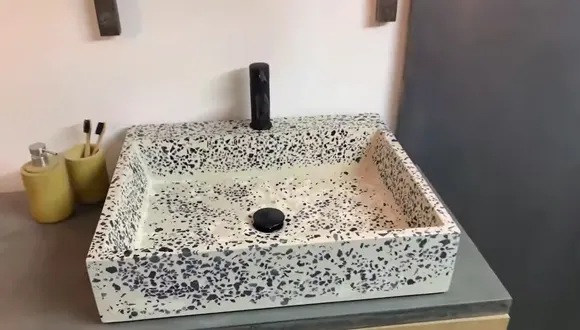
Sealing your concrete sink is essential in keeping it stain-free and good-looking, but how many coats should you use? The short answer is that you should apply at least two coats of sealer to your concrete sink.
The first coat will help fill in any pores or cracks on the sink’s surface, and the second coat will provide an extra layer of protection. If you’re concerned about the appearance of the sealer, you can always choose a transparent variety that won’t alter the look of your sink.
But, if you want to add a bit of shine or change the color of your sink, there are plenty of tinted sealers to choose from. No matter what type of sealer you choose, applying two coats is the best way to protect your concrete sink.
Does the Concrete Countertop Sealer Wear Off From the Concrete Sink?
The lifespan of a concrete countertop sealer will vary depending on the quality of the product and the amount of traffic the sink receives. Generally, a good quality sealer can last several years with proper care.
While concrete sealer does provide some protection to your concrete sink, it will eventually wear off if the substrate surface itself wears away. The frequency with which you need to reapply the countertop sealer will depend on the type of sink you have and how often it is used.
Most sealers will need to be reapplied to maintain their effectiveness. Depending on the type of sealer used, this may need to be done every few years or more frequently.
Can Silicone Sealant be Used on Concrete Sink?
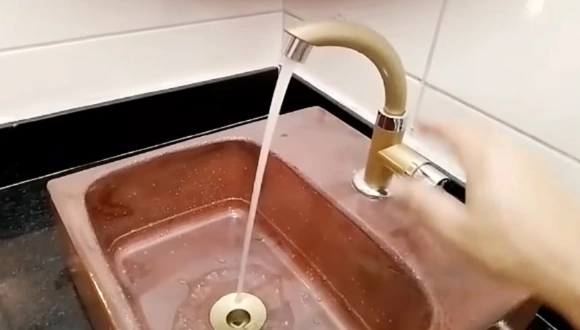
Silicone sealant is an excellent way to seal a concrete sink. It is durable and long-lasting, creating a waterproof barrier that will keep your sink looking new. But, not all silicone sealants are created equal.
If you have a concrete sink, you must use a silicone sealant with a low modulus or non-staining. This sealant will not damage or stain your sink, creating a strong seal that will last for years. When choosing a silicone sealant, read the labels carefully to ensure that you select the right product for your needs.
Do Concrete Sealers Last on Concrete Sinks?
The answer is a resounding yes. Concrete sealers can last for ten years or longer on concrete sinks when applied correctly. To ensure the longevity of your sealer, keep these points in mind:
- Before applying the sealer, you should clean the sink thoroughly. Any dirt or debris will reduce the effectiveness of the sealer.
- Be sure to apply the sealer evenly and not too thickly. Too much sealer can cause cracking and peeling.
- Don’t use the sink until it’s completely dry.
Is Sealing Concrete Sink Expensive?
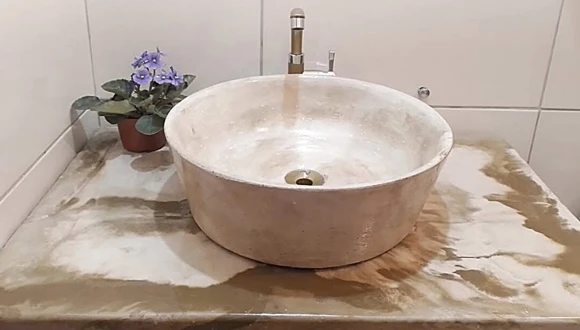
Many people are concerned about the cost of sealing concrete sinks. The good news is that sealing a concrete sink is not as expensive as you might think. The average cost of sealing a concrete sink is only about $1.20 to $1.75 per square foot.
Compared to replacing a damaged or stained sink, sealing a concrete sink is a very affordable option. Also, sealed concrete sinks are easier to clean and maintain than unsealed sinks.
Is Concrete Sink Sealing Worth it?
The sink will become stained over time if it is not properly sealed. Unsealed concrete can also be challenging to clean, as dirt and grime can build up in the pores and be challenging to remove.
If you choose to seal your concrete sink, you’ll be glad to know that it will be much easier to keep clean. The sealant will provide a barrier against staining and dirt buildup, making it much simpler to keep your sink looking its best.
Also, a sealed concrete sink will be more resistant to chips and scratches. So, if you’re wondering whether or not concrete sink sealing is worth it, the answer is definitely yes.
